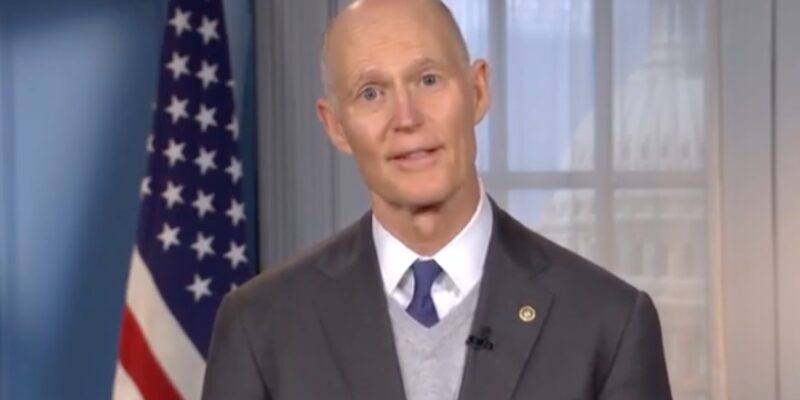The U.S. Senate unanimously passed (96-0) the Coronavirus Aid, Relief, and Economic Security (CARES) Act to help kickstart the ailing U.S. economy, but most Republican senators like Florida’s Rick Scott (R) are not happy they had to vote in support of wasteful spending measures they would usually never for.
Shortly after taking his “yes” vote, Sen. Scott stated that he had “significant reservations” with many of the wasteful spending “provisions” that go against his core beliefs,” adding that he supported the bill to help those Americans who lost their jobs or lost their wages because of the spreading COVID-19 pandemic.
Here are the main points of his response to the vote:
“I have significant reservations about many provisions in this bill that are antithetical to everything I believe in, but we’re facing a crisis and this is the only option to get immediate help to small businesses and unemployed workers.”- Sen. Rick Scott (R)
The kind of Good
- My focus is on the workers who have lost their jobs, had their hours cut or are getting lower tips, and small businesses that have been forced to close or have lost significant revenue.
- “There are many good things in this bill – more funding for our health care workers, personal protective equipment and expanded testing, and more support for small businesses. I was also glad that negotiators included many of the recommendations I’ve been makingover the last few weeks.
- “I called for a moratorium on financial payments, including rent, mortgages, credit card payments, taxes, and utilities. While this bill doesn’t go as far as I would like, the moratorium on evictions will provide much-needed relief and peace of mind for those struggling to make ends meet.
- “I was very clear about my opposition to bailouts for big corporations. These companies have enjoyed a decade of financial success and a blank check from taxpayers was unacceptable. While I still fear this bill could be used to provide relief to companies that can afford to take care of their workers without government assistance, I’m glad to see it requires a return on investment for the taxpayers. It also includes significant oversight of how the funds are disbursed and prevents these companies from laying off their workers or buying back their stock. I will be vigilant in making sure that these companies don’t abuse this process.
The Bad
- “But there are provisions in this bill that I wholeheartedly disagree with. I’m concerned that sending taxpayer money to Americans who still have jobs and are receiving a paycheck is a policy that has not been well thought out. This money won’t stimulate the economy. In a time of crisis, people don’t spend money; they save it. And many of the places they might be tempted to help stimulate are businesses that the government has shut down.
- “We have to remember that $2 trillion in new spending means a $2 trillion tax increase somewhere down the road – even in a crisis, we need to be smart about how we spend taxpayer dollars. We know that Chuck Schumer and Nancy Pelosi tried to stuff this bill with their liberal pet projects that have nothing to do with this crisis, proving once again that Democrats should never be in charge of anything.
- Senator McConnell and President Trump were successful in beating back most of them, but this bill still includes funding for pet projects wholly unrelated to responding to Coronavirus, like the Kennedy Center, the National Endowment for the Arts, and bailouts for mass transit.
- “The price tag on this bill is staggering. This bill amounts to almost $6,000 in new debt for every man, woman and child in America. We should not fool ourselves into thinking this is something we can afford. When this crisis is over, Congress MUST propose a plan that cuts federal spending over 10 years by AT LEAST the total amount this bill spends – funding for the Kennedy Center should be the first thing we cut.
President Trump has said that he hopes the U.S. economy will be open by Easter, but as fast-spreading virus could dampen those hopes.





